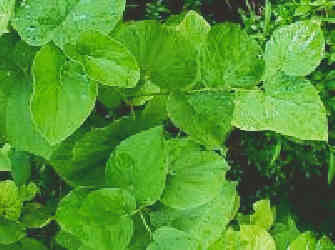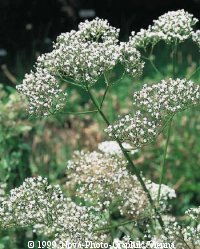 |
|
Scullcap |
By Daniel Gagnon
Prescription drugs for relaxation can make you feel hazy, but botanical medicines can help you feel clear and calm when you're under stress.
Stress. We all have it—and we all need it. Stress is any
demand made on our bodies, minds or emotions including the demand to maintain
life. Stress is what tells us to come in from the cold or
to get out of an unhealthy relationship.
Though stress is a necessary part of life, if it continues or becomes excessive, it becomes distress and causes physical and psychological reactions such as depression and ulcers. "When stress occurs in quantities the system can't handle, it produces pathological changes," according to Tabor's Cyclopedic Medical Dictionary (F.A. Davis Co.). This means when high levels of stress last for long periods of time, the body suffers. Therefore, we must recognize that stress symptoms including sleeplessness, achy muscles and fatigue are calls to action and that our health is jeopardized when we allow stress symptoms to accumulate.
Herbal medicine can help alleviate stress-related nervous system complaints. To select the best herbs for you, remember that specific stress-related herbs have specific ranges of action. Also, some of these herbs are best taken at certain times of the day. Avoid drinking alcohol when you're taking herbs and other medicines. If you find your symptoms continue despite taking herbs, seek the assistance of a primary care physician.

California Poppy
California poppy At night the California poppy (Eschscholzia californica), a dainty flower, closes into itself and seems to go to sleep. In the same way, this herb when prepared medicinally permits sound sleep for those who have difficulty falling asleep or for those who wake during the night or too early in the morning. It's specifically indicated for sleep disturbances such as waking up at specific intervals throughout the night. California poppy, which is actually more effective for sleep disturbance problems than the more popular valerian, is a relative newcomer, so we don't know exactly which of its constituents induce sleep. California poppy is also great for sleepless, frenetic children.
Chamomile Chamomile (Matricaria recutita) is a gentle yet effective relaxant. Taken during the day, it helps you calm down without interfering with your concentration. Taken one hour before bedtime, it relaxes you in preparation for sleep. Chamomile is also particularly useful when stress starts to affect your digestive system and especially if you have ulcers. Chamomile is a safe herb to use with children who are hyperactive or have stomach upsets.

Kava-Kava
Kava kava If nervousness, agitation, feelings of anxiety, or muscle rigidity or tension are threatening your serenity, kava kava (usually referred to as kava), an herb from the South Pacific islands, is for you. A 1990 study of patients suffering from anxiety showed kava (Piper methysticum) possesses anti-anxiety properties comparable to sedatives but without the hazards, says Chris Kilham in Kava: Medicine Hunting in Paradise (Park Street Press). In a 1993 review of kava in the British Journal of Phytotherapy, herbalist Kerry Boone reports on the mood-elevating and muscle relaxant effects of kavalactones, the active ingredients of kava. In the last two years, kava has made the "hit parade" of herbs in demand, in part due to inappropriate labels and misuse as a so-called herbal "mellower." While kava does have a relaxing effect, it doesn't alter your consciousness despite creative marketing implying it does.
Passionflower Studies show passionflower (Passiflora incarnata) has sedative properties, relieving anxiety and tension that prevents relaxation and sleep (Planta Medica, 1988, vol. 54, no. 6). Taken during the day, passionflower won't make you drowsy or negatively affect your concentration. Stronger than chamomile, passionflower specifically counters nervousness and unrest due to "mind hyperdrive." If you can't stop thinking of things you have to do, people you have to call before lunch or plans to make for tomorrow, then passionflower is for you. If taken before bed, it also calms a busy brain.
Scullcap Scullcap (Scutellaria laterifolia) is the herb to take to help restore balance when you feel overly sensitive, frenzied, edgy or restless, or are plagued by bothersome twitches. This is because it calms the peripheral nervous system, which includes the sensory nerves. Researchers don't yet know which constituents are responsible for the various actions of scullcap, yet they know it calms excessively heightened senses of sight, hearing, smell, taste and touch. It may also effectively stop the phantom pains of an amputated limb, pain from shingles or herpes, and acts as a nourishing tonic for the nervous system.
Siberian ginseng To help the body maintain its balance before stress overwhelms you, institute a prevention regimen that includes Siberian ginseng root (Eleutherococcus senticosus). Siberian ginseng helps the nervous system because it's an adaptogen, a substance that helps your body cope better with stress. This means the herb balances the body and helps it become stronger in the face of adversity, be it physical, mental or emotional. Siberian ginseng helps you rebuild when you feel weak, fatigued, depleted, depressed or exhausted. Though it's slow acting, over a period of three to four weeks it will make you feel stronger, more energized and protected.

Valerian
Valerian Stress, nervous exhaustion and nervous tension are disorders for which valerian is best suited. Studies show valerian (Valeriana officinalis) can improve sleep quality and relieve insomnia (Planta Medica, 1985, vol. 54). The root of the plant is used all over the world for restlessness and poor sleep from pain or trauma. Valerian root acts upon the central nervous system as a depressant (Planta Medica, 1980, vol. 38).
In his classic book Herbal Medicine (Beaconsfield Arcanum), Rudolf Weiss states that valerian seems to work two different ways: with a sedative action and a balancing depressant action on the autonomic nervous system. Valerian works most effectively when it's taken one hour before sleep. Note: The mood-suppressing drug Valium is not made from valerian. There's no relationship between the drug and the herb.
Neither California poppy, chamomile, passionflower nor valerian interferes with Rapid Eye Movement (REM) sleep—the period when the body undergoes repair and rejuvenation—as many over-the-counter sleep aids do.
Herbal combinations If you have multiple stress-related nervous system problems, look for formulations in extract or capsule form that feature combinations of the herbs discussed here. Or consult an herbalist or a knowledgeable practitioner about which combination of herbs would be most effective for you.
As long as the need for homeostasis (equilibrium in the body) is fundamental to our existence, stress will be our ally to remind us of the need for change. We can help ourselves most by changing our perception of stress and being willing to act to rebalance what is unbalanced.
Daniel Gagnon has been a practicing medical herbalist since 1976. He lives in Santa Fe, N.M. He's the co-author of Breathe Free (Lotus Press).
Reprinted with permission from the May 1997 issue of Delicious! Magazine, a publication of New Hope Communications, Boulder, CO.